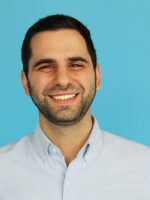Every day, Marty Doerschlag moves through the world armed with what amounts to a low-level superpower: He can remember a face forever.
"If I spend about 30 seconds looking at somebody, I will remember their face for years and years and years," he says.
Doerschlag began to recognize his talent well into adulthood, after a series of strange encounters and sightings. There was the man he recognized in the Dallas-Fort Worth airport, someone he'd sat behind three years earlier at a Michigan vs. Ohio State football game. (Doerschlag remembered the man but not the score of the game.)
There were the company Christmas parties where he could always remember exactly who was whose spouse. And there was the time he asked a waiter serving him in a Las Vegas restaurant if he'd also served tables many years earlier at a particular restaurant in Columbus, Ohio.
"The guy just froze," says Julie Doerschlag, Marty's wife, who was with him for all of these incidents. "It was probably 15 years before. And [the waiter] said, 'Yeah, you're right.'"
But here's the thing. Just as some humans are spectacularly skilled at recognizing faces, others are completely incompetent.
"I think nobody really knew until the last few years just how bad we all are with unfamiliar faces," says Mike Burton, a professor of psychology at the University of York UK. Burton has run a number of facial recognition studies and has concluded that most people are remarkably bad at recognizing the faces of those they know only slightly. And to make matters worse, most people think they are good at this skill when they are not.
This week on Hidden Brain, stories of super-recognizers...and the rest of us.
Hidden Brain is hosted by Shankar Vedantam and produced by Jennifer Schmidt, Rhaina Cohen, Parth Shah, Laura Kwerel, and Thomas Lu. Our supervising producer is Tara Boyle. You can also follow us on Twitter @hiddenbrain.
Additional Resources:
"Face Recognition by Metropolitan Police Super-Recognisers," by David J. Robertson, Eilidh Noyes, Andrew J. Dowsett, Rob Jenkins, and A. Mike Burton in PLoS ONE, 2016.
"Passport Officers' Errors in Face Matching" by David White, Richard I. Kemp, Rob Jenkins, Michael Matheson, and A. Mike Burton in PLOS ONE, 2014.
Copyright 2025 NPR





